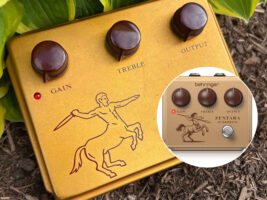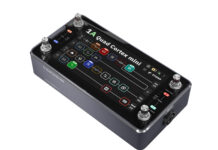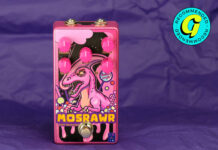
Klon Centaur maker’s lawsuit against Behringer has been dismissed
After Behringer launched the $69 Centaur Overdrive last year, Bill Finnegan – creator of the original Klon Centaur, sued the brand’s parent company Music Tribe over “blatant counterfeit”.
News of the suit spread quickly in the guitar world, and some Behringer Centaur Overdrive units were being listed on the second-hand market for up to $2,000, with collectors preempting a discontinuation and rise in scarcity.
In the following days, Behringer changed the name of the unit from Centaur to Centara, and made a number of visual changes, like putting the Behringer logo on the pedal’s front face, and changing the graphic design of the centaur. Quietly since, the name of Behringer’s pedal has again been changed to ‘Zentara’.
The dispute went quiet in recent months, but it’s now been revealed that the case has been dismissed by the United States District Court for the District of Massachusetts.
A court document confirming the lawsuit’s dismissal is available to read on CourtListener – although it doesn’t provide much information other than the fact the case has been dismissed, and that there are no costs incurred to either party.
Though purely speculation, it’s possible Behringer/Music Tribe and Bill Finnegan reached an out-of-court settlement, either monetarily or through an agreement which stipulates the conditions upon which Behringer can continue to sell the Zentara.
Guitar pedal clones are very common, with brands issuing their takes on classic units commonplace. In terms of the legalities of pedal clones, it’s not possible in most cases to patent the design of an electronic circuit, so pedal makers protect their products via trademarks regarding their trade dress – effectively how a product looks.
In his lawsuit against Behringer, Bill Finnegan noted that “consumers expressed extensive actual confusion… with many rushing to purchase Defendants’ counterfeit pedal believing Defendants are delivering on a mass scale a discounted product licensed or endorsed by Plaintiffs”.
It’s worth noting, though, that – in the US – trademark laws are written so that if a company doesn’t enforce its trademarks, it marks it harder for them to fight future cases of infringement.
This formed the basis of Dean’s defence in its legal battle against Gibson, as it argued the guitar giant had taken too long to enforce its trademarks. In that case, Gibson’s award after triumphing was recently upped from $1 to over $168,000.
The post Klon Centaur maker’s lawsuit against Behringer has been dismissed appeared first on Guitar.com | All Things Guitar.
Source: www.guitar-bass.net












